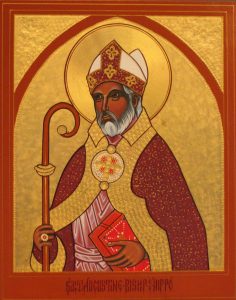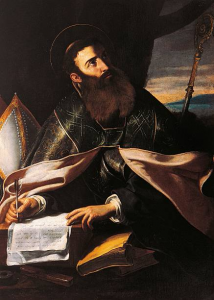Holding Fast and Standing Firm to Justice, Mercy and Faith
Memorial: St Augustine
(2 Thes 2:1-3,14-17; Ps 96; Mt 23:23-26)
****************************************
“Heavens glad, earth rejoices, fields exult for the Lord is coming to judge the earth.” How can this joy over being judged make sense?
The answer lies in the other readings: Those who practice justice, mercy and faith; those who stand firm and hold fast to the traditions taught by St. Paul, and those who have the faith to seek healing of their shortcomings, will have no reason to fear and every reason to rejoice. May that include us!
The psalm is surprising with its joyful tone at the coming judgement of the earth by God. One would expect fear and trepidation in its place.
St. Paul reminds the Thessalonians if they are grounded in his teachings about Jesus Christ, they can live in hope, be comforted in their hearts and be empowered to do good works.
In the gospel, Jesus chides the scribes and Pharisees for their hypocrisy, focusing on superficial details like mint, dill and cummin, instead of putting their energy into working for justice, being merciful and forgiving, and sinking deeper roots of faith.
A more contemporary and humorous anecdote illustrates this superficial attitude of the religious leaders: an overly scrupulous deacon was taking extra time trying to make sure he put only one drop of water into the wine during the preparation of the gifts at the Eucharist. The presider, noticing this, remarked curtly, “It’s a ritual, not a recipe!”
Jesus then goes on to also chastise the religious leaders for their religious externalism, always seeking to “look good” on the outside, while neglecting to do any inner healing work. His command to clean the inside of the cup refers to our need for two important spiritual realities – forgiveness for our sins and failings, and healing of our sinfulness and defects of character – that which makes us sin.
There is a saying, “Name it, don’t blame it, claim it, tame it, and you can aim it.” Basically, Jesus is teaching the importance of self-awareness – knowing ourselves, the painful emotions like anger and resentment we may be carrying, as well as the negative attitudes lurking within us, such as false pride, stubborn self-will, tendency to control and judge, etc. These are the things that Jesus came to heal and take away.
Many of us are spiritually and personally blind – either we are not aware of who we really are inside, or we are living in denial, afraid to go there and find out. As one retreat master put it once, “You are who you are who you are – what are you afraid of?
Today the church honors St. Augustine, someone who slipped away from his faith but finally found his way back. Born in North Africa, St Augustine lived from 354 to 430. He went to university at Carthage to study rhetoric but became interested in philosophy and literature instead. Searching for an answer to the problem of evil, he became a follower of Mani, a Persian prophet, whose philosophy promised to explain all that exists. While at Carthage, Augustine took a mistress and they had a son, Adeodatus.

Augustine taught in North Africa for several years and then opened a school of rhetoric in Rome, moving to Milan in 384. There he heard the sermons of Bishop Ambrose and became convinced of the truth of Christianity, abandoning Manichaeism and returning to his Christian faith, something for which his mother St. Monica had prayed for many years. He, his mother Monica, his brother, his sons and some friends withdrew from the city to live a simpler life based on the evangelical counsels and to prepare for the sacraments, while his mistress returned to Africa. At Easter 387, Augustine was baptized by Ambrose and he and his entourage went to North Africa. His mother died later that year and his son died in 389.

In 391, the people of Hippo, near his hometown of Targaste, insisted Augustine become ordained. Priest and ascetic, he established a religious community and began preaching. In 396, he became bishop of Hippo, where he spent the rest of his life.
Augustine founded a community for women headed by his sister. A letter addressed to this community concerning the principles of the religious life (usually referred to as the “Rule of Augustine”) has become the basis of the constitutions of many religious communities. During his lifetime, Augustine successfully defended the Christian faith against several heresies. He died on this day in his 76thyear, as the Vandals besieged the city of Hippo.
These events and many more are recounted in Augustine’s Confessions, a classic of spiritual autobiography. His other writings include City of God, De Trinitate(On the Trinity) and De Doctrina Christiana(On Christian Doctrine). Some of his favorite themes include grace, the Trinity, Scripture, history and the journey to the mind of God. He is one of the greatest Fathers of the Church, known as the Doctor of Grace.
The Eucharist is a wonderful way we hold fast and stand firm to a great truth. It is also a great act of faith, an experience of God’s mercy and empowers us to work for justice and be merciful. May it sent us on healing journeys, and also help us wait in joyful hope for that great day of judgment.




We should try to get to know ourselves then pretend to be this good person by hiding all these bad and negative habits with anger , resentments , bitterness, stubbornness, control and judge others. If we don’t try to open ourselves and find out the truth about who really are , we would not be healed. We have to try to face our emotions, thoughts and problems as to what kind person we are ; it will control our lives. God is the one who does all the healing from physical pain to emotional pain . He is the one who knows and sees who we are and what kind of person we have become. He is one that knows us because he created us on this earth. We need to face reality as to who we are, no one is perfect in this world. We need to dissolve all these negative thoughts and attitude by cleansing ourselves and start over as a new person. If we believe in God and follow him we will be saved by sins and wrong doings. Amen . Many Blessings!
Thanks again Bishop Lavoie for the following messages and homilies in meeting and knowing the truth about our selves. It is a blessing and a gift from God . Thanks for sharing . Gracias ! Keep it up !